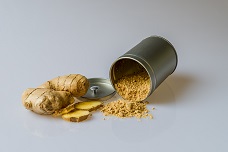CONSULTANTS from CAIF (Concentrated Active Ingredients & Flavors), Inc, a US-based supplier of botanical extracts, flavours, powders and flakes, share the benefits of five of the company’s on-the-rise ingredients: acerola, elderberry, quercetin, turmeric, and zinc:
Overview of the immune system
“Among other illnesses, a weakened immune system can lead to immunodeficiency disorders & disease progression” 1
Our immune system is our body’s automatic defence army which is programmed to stop viruses, bacteria, and other invading organisms, from harming us and generating disease. However, if our immune system is compromised and weak, the invading pathogens can carry out their destructive work unhindered, thus making us easy prey to new disease; vulnerable to the progression of a disease we already have; subject to immunodeficiency disorders; and a victim of excessive fatigue, infections, colds, and so on. But as specialists such as those at CAIF, are aware, countless research papers (many of which have been published in peer review journals), have indicated that: “specific nutrients found in certain botanical extracts have been proven to enhance physiological mechanisms and promote the correct function of immune cells which help support overall immune system integrity” 1.
Ingredients to enhance and add value to food, beverage, and supplement industries
Acerola is one of the top natural sources of vitamin C (ascorbic acid), which is known for bolstering the immune system. In addition to this, it houses pro-vitamin A, vitamin B1, vitamin B2, niacin, iron, albumin, calcium and phosphorus; as well as a spectrum of phytonutrients including flavonoids, anthocyanins, phenolics, and carotenoids. (Phytochemicals are non-nutrients found within plants. These phytonutrients offer various biological activities and lower the chance of contracting countless chronic diseases.) Further, over the last few years, there has been a massive surge in interest in Acerola by pharmaceutical companies and the scientific community alike1. And on top of this, more and more consumers are reading about its wonderful benefits.
Elderberry berries and flowers are bumper-packed with certain immune-boosting vitamins and antioxidants, and research has indicated that these constituents can lower stress levels, help combat inflammation, and protect the heart. This botanical is a great asset to industry, as it can be added to: teas, lozenges gummies, syrups, wine, jam, food colouring, and face and body lotion 2.
Quercetin is renowned for its anti-viral activity; stimulating the immune system; decreasing pro-inflammatory cytokines; generating leukotrienes; and supressing the production of IL-4 3.

Turmeric (Photo: Dreamstime.com)
Turmeric’s much researched bright yellow-orange component, Curcumin, is a potent immunomodulatory agent which can regulate the activation of T-cells, B-cells, macrophages, neutrophils, natural killer cells, and dendritic cells. Moreover, it can downregulate the expression of a number of proinflammatory cytokines. In fact, even at low doses, curcumin can heighten an antibody response. This indicates that its reported beneficial effects in cancer, diabetes, Alzheimer's, asthma, allergies, arthritis, heart disease and atherosclerosis, could in some way, be due its ability to regulate our immune system 4.
Zinc is vital for the development and functioning of the cells which mediate innate immunity, neutrophils, and NK cells. Further, if an individual has a zinc deficiency, then their macrophages are compromised. Moreover, intracellular killing, the production of cytokines, and phagocytosis, all are impacted by a zinc deficiency 5. To that end, everyone should ensure that they receive enough of this very important mineral, be it via food, or drink.
Manufacturing companies can easily add these ingredients to their food (both human and pet), beverages, and nutritional products.
References
1 Prakash A and Baskaran R. “Acerola, an untapped functional superfruit: a review on latest frontiers.” J Food Sci Technol. 2018;55(9):3373-3384.
https://www.ncbi.nlm.nih.gov/pmc/articles/PMC6098779/
2 WebMD (2018). “Elderberry.”
https://www.webmd.com/diet/elderberry-health-benefits#1
3 Mlcek, J., et al. “Quercetin and Its Anti-Allergic Immune Response.” Molecules. 2016;21(5):623. 2016 May 12.
https://www.ncbi.nlm.nih.gov/pmc/articles/PMC6273625/
4 Jagetia GC, Aggarwal BB. "Spicing up" of the immune system by curcumin. J Clin Immunol. 2007 Jan;27(1):19-35.
https://pubmed.ncbi.nlm.nih.gov/17211725/
5 Prasad, A.S. “Zinc in Human Health: Effect of Zinc on Immune Cells” Mol Med. 2008 May-Jun; 14(5-6): 353–357. Published online 2008 Apr 3.
https://www.ncbi.nlm.nih.gov/pmc/articles/PMC2277319/














